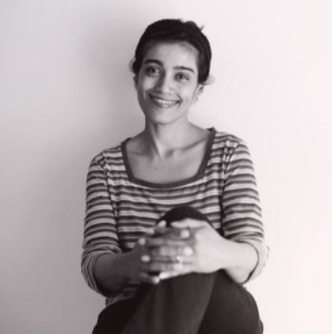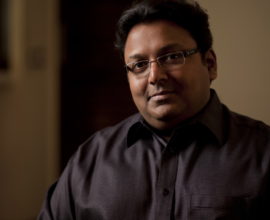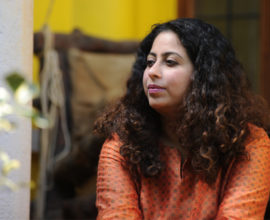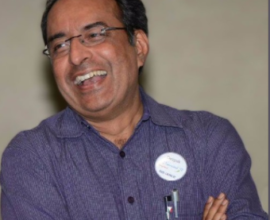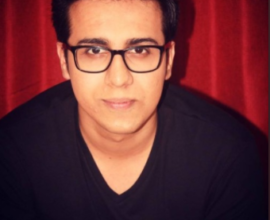Jane De Suza, Author of 5 Books, Shares Her Success Journey
[Music]
Kiruba: Hello and welcome to the First Book Podcast, India’s first and only Podcast dedicated to helping first-time authors. In this podcast series, we have conversations with bestselling authors and business leaders to understand how they successfully crack their first book. This conversation helps us to get a sneak peek into their journey as an author. This podcast is done in association with Notion Press, one of India’s largest publishing ecosystems. In this episode, we have an interesting conversation with Jane De Suza one of the finest authors in India. Jane is an ex-creative director and a consultant, who set aside her 15 years of churning out advertising slogans and articles to write books full-time. Her novels include Happily Never After, A Hilarious Love Story, and the detective comedy, The Spy Who Lost Her Head. She has also authored the best-selling Laugh Out Loud super zero series for children. Let’s now listen to the conversation with Jane De Suza. Here is a great podcast for writers to begin their publishing journey.
[Music]
Kiruba: Jane, thank you so much for coming on the First Book Podcast.
Jane: My Pleasure. Thank you for having me.
Kiruba: Congratulations on your fifth book, Happily Never After. That’s a fascinating title, Jane.
Jane: Isn’t it? Ya.
Kiruba: Tell us a little bit about it, please.
Jane: The usual love story. It has a boy meets a girl, they fall in love, they get married and many scenes and many heights and tears later, 200 pages later in the book, they get married, and then you come to an end same as a romantic film. And then what happens? A year after, ten years after you know it’s not the end, it’s just the beginning. My book starts ten years after the end, after when the Happily Never After was supposed to begin. And it takes up from what their lives and love story really are . The love story we are all living.
Kiruba: Got It. You were an advertising professional almost all your adult life. You were a creative director and occupied a fairly senior position in large advertising agencies. So when did this love for books start?
Jane: Love for reading books started when I was four or five years old, and I discovered my dad used to have this huge stash of William, ritual components William. He had them, and I discovered them, I discovered National Geographic. I can’t remember either that or child life without books when you ask me. I was the only child, so I guess all the goblins and everybody were my family.
Kiruba: I can empathize as that because I was the only child as well.
Jane: So you imagine up a whole lot of siblings. Some human and some not right?
Kiruba: Very True.
Jane: I have a management pinwheel, and I join off campus during the weekends to recruit, and I joined them as a marketing executive.
Kiruba: Which Management?
Jane: This was XLRI? Like all other kids I was trying to get through my competitive exams and dieing to join one of the top institutes, and I did. But about 6 months into my marketing career, I couldn’t sell anything besides my life. I dint like numbers as much as I liked the outside world numbers. So I began to instead of giving my creative thing to brief I would sit and write myself hoping there wouldn’t discover it somewhere along the way. But they did, and then that’s a long story. Sanjay and my branch manager, told me to do a copy test, and I got into writing. And after some time in advertising writing, I started writing for a whole lot of magazines and newspapers, articles and then it was just a natural flow. And then a story came up in my head and I began to write in the nights, not knowing that would ever see the light of day. But it did.
Kiruba: Beautiful ! So it’s not like you one day woke up and decided to be an author, and you had a strong foundation of writing or creative writing and that kind of natural flow, flowed in the form of books, and that’s how you got this out.
Jane: Absolutely. I don’t think I ever planned anything consciously in my career, that’s the best part. It’s like walking down a road, and suddenly there are these paths that suddenly open up, just take the paths and see where it goes. And I think it rarely ever goes wrong and I don’t want to use the cliché and say follow your heart or follow your instinct. Don’t plan, because a plan makes you restricted for money and opportunities out there. Just go for it and do whatever you feel like doing, do it in the nights.
Kiruba: So Jane, when I do these interviews as I did for my first book podcast, I’ve noticed that quite a few people are actually, text journalists, advertising professionals like you are very understandable because you have grown up with words in different formats and I am not surprised how you turn into an author. What would be your advice for someone, say a doctor or lawyer or a software professional who have dreams of becoming an author? What would be your advice for non- creative people or non-writers?
Jane: That’s interesting, more than advice, my first question would be why do you want to become a writer? There is no money in it. Incase you think everyone is going to turn into a J.K Rowling, they are not. Then why? If it is for money, drop it right now. If it’s something out to the universe, say if you have a story inside you and you want to get it out, that is a really good reason. So again you have two options, if you are not a writer if you do not have words, but you have a beautiful story then you should consider co-writing it with somebody. I have just co-written myself, I have written a book for a psychologist, Deepika Padukone’s Psychologist. She had counted on me. She had a story, and she wanted it out there, but she’s not a writer herself. So that’s one thing people like sports people or doctors who have something to say, something of immense value in their careers, they could co-write it with somebody who has the flair for words.
Kiruba: For many first time authors, they are also a little scared about what the outside world will think. What if they actuallywrite and the book comes out, and it’s not of good quality. I’m sure you went through a similar journey as well. How did you go about it and what will be your advice for others.
Jane: Actually the fear is a good thing. It keeps you quality conscious, I mean you should not take anything for granted, you should not rest back and say this is just one of those things I have to tick off on my bucket list, it should not be that. If you want to write a book or whatever it is, I think you have to pour your entire passion into it, and that’s the best thing you’ve got. So, people who say I write only for myself, I don’t know how far that is true. Most authors write for the universe out there, like people to appreciate it, get back to them with feedback and things like that, I would. So it is natural to be afraid of how your book will be received, and there is no shortcut solution to that. The only thing you can do is write it and be brave. I think writing is one if the bravest things you can do because you are putting your whole mind and soul out there for people to judge you, you’re putting it out on a booknor paper. Once it’s out there, that’s your only judge. If people love it, then you are lucky. If people don’t like it, keep writing that’s ok. So I would like to take an example from my own pay. The first book I wrote was a humor thriller, and almost everybody spoke about it. They were supportive. but the other people whom I had mentioned to you about, couldn’t write a humour thriller. A thriller has to be page turning, you can’t make people laugh. But I went ahead and just wrote it. I mean that was the book inside me, and I just had to write it. And all turned out very well for me. So that’s the only advice I have to give.
Kiruba: The thing I get out of your particular incident is for you to enjoy yourself and for you to do what you like doing.
Jane: Yes. You owe it to yourself. Absolutely.
Kiruba: What was that feeling when you had your first author’s copy of The Spy Who Lost Her Head, you know the book when it landed. Explain that emotion.
Jane: To be very honest the first emotion wasan utter terror. I was like what if there is a spelling mistake or a grammar mistake. But the initial feeling is that I am out in the world, a book that I wrote sail out into the world. That’s the feeling.
Kiruba: Beautiful. How did you manage, you have authored five books now, what was the writing discipline that you followed that has really worked for you?
Jane: This differs from writing styles differ, discipline differs. So I have been to many Litfests now and had conversations with other authors, and many say writing is a discipline and many have the writing of 1000 words a daily discipline. You sit and write no matter what mood you are in. But I don’t follow any of that rules. That’s been my career advice throughout. So writing comes naturally to me, it is a gush at some points of time, and then I write late at night to early in the morning say 2 or 3 a.m. and I can’t stop. Then I shut my laptop with a bang, and I get a relief again and probably get up at six or whatever. I do this for a week, and I go for a walk around during the day like a zombie and the next week I am completely dry, that happens and just nothing. So I don’t force myself, this is not homework for me. It shows. When I love to write, I think it shows. It shows that I am not forcing it.
Kiruba: This is something that I have noticed Jane, when I do these interviews, I notice a trend. There are full-time authors whose entire career depends on their book because they take it as work. Their entire livelihood depends on the book; they tend to follow a far more regimented approach, as it is someone who writes books for the love of it meaning that you’re career or livelihood doesn’t depend on your books, then people do it according to their moods or really when they feel like it? That’s one thing that I have noticed. For you Jane, you quit your advertising career after nearly a decade and a half in a senior position, and now you are on your own, am I right? And then you have your family, your kids to take care off. I can see this as a truly juggling activity. So how do you juggle and had there been any best practice that you have gotten out of?The reason why I am asking is, there are many people in a similar situation, people who own a full-time job and still want to write. So we would like to hear how you managed?
Jane: So Kiruba, the latest novel Happily Never After, it’s absolutely above this. So I’m shamelessly plugging my book in here because it is about a woman who is ten years down with marriage with kids and dogs and in-laws and the usual stuff. And she wondered where she was; she had a huge list of things to do and things to repair and meetings you know the usual project work. She suddenly wonders where she is on that list and she wonders whatever happened to her dream. She wanted to be someone, she wanted to do something in life, and then all those dreams have been buried under the EMI’s and the loans, our day- to- usual day stuff in our lives. Where do her dreams go? And then it’s a question of meeting a priority. making time for that and making some space for that in your life. As you said I have a family, I have two boys, a husband, a mother, a dog and you know various other people I take care of. Also, I have a job, I freelance, but I work out of home to earn my own money because I like being independent and I think that’s very very important for a woman. I have all this on the one hand, and then now the books have hit. So I have a lot of traveling and an interview, about 30% of my time goes in that. As I said I don’t plan, but the best tackle out there is that it all fits in. Your time is not finite I tell you. You can juggle around. A time when I am writing I need absolute silence, so I write in the night and make up for it somehow during the day or a weekend. But I use the night with pure silence after everyone sleeps, to write. At times, I feel I will crack up a bit but at the end of it, the feeling of having done something, the feeling of doing something you love and not regretting it later after you were 60 saying I should have written.
Kiruba: Now that you’ve finished your books, I am sure you put all your advertising experiences; you’ve spent your life marketing other people’s products and services. What did you do to market your own book?
Jane: So for this book, I am very fortunate to have Amruta Talwar of Harper Collins who has been griping over with lovely ideas. She did a Facebook contest because a lot of readers are online right? The Facebook contest had a lot of things the book carried you know, on soul mates, whom do you turn to when you are in trouble. And there have been a plenty of replies, responses to that Harper Collins did that. They also did a contest at the Costa outlets, the coffee outlets at the south. Again a little tent cards and few questions about the book and not about love and stuff like that. That idea about marketing your book is getting your book into the scene, just get it seen and then it has to do its own work. So right now the people know about the well-known names and their books keep repeating themselves. But if you’ve written a book and you think it’s good, your primary marketing should be seen as if it has enough values of its own, and it will stand on its own feet. The idea is to get it out there and get as many people to see or notice it. And once they start reading it depends on your book and not the marketing. I write children books as well and what works best for it is school visits, workshops. You get the child charged up about the story, and you got him pester his parents. And lit fests and workshops work well as a marketing tool in that category.
Kiruba: Excellent. One last question before we wrap up, do you have any future books in mind?
Jane: At any given point, I have about 4 or 5 lying in my laptop. And I think that’s not much of the entire book. You know this germs of ideas some written off, and this is the other thing I’d like to tell potential authors out there, don’t judge. Don’t judge your writing and don’t give up on a book. So if you start, you typically run out by the third chapter. The idea that seems so brilliant is just pushed out. But if you start it and come back to your daily life, at some point you could come back to it or start on another. But just don’t give up or don’t judge yourself.
Kiruba: Awesome. Wishing you the very best in getting those ideas into reality Jane. I want to thank you a lot for taking the time out and sharing your wisdom and experience.
Jane: It’s been a lovely chat, thank you.
[Music]
Kiruba: You were listening to the conversation with Jane De Souza, author of 5 books. I hope you learned something useful from this podcast. To listen to the best of the episodes with other bestselling authors, please visit notionpress.com/podcast. I look forward to seeing you in the next episode until then, take care and bye.
[Music]

